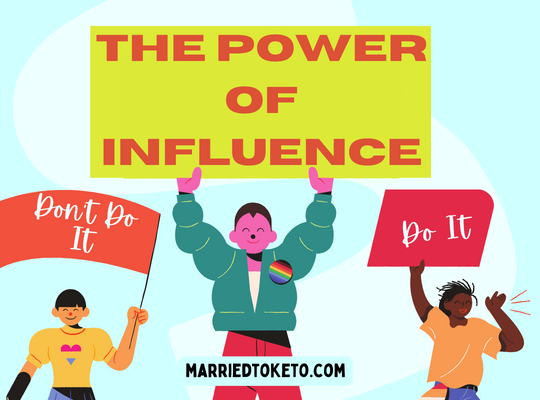I have a job other than telling everyone who will listen about keto. I work with adults who have intellectual disabilities. One of the reasons I started this blog was to help people start keto if they want to make this change. But, I do not talk to these adults I support about keto – even if I think it would improve their health. I was asked why I don’t bring it up at work, and it made me think – when is it okay for me to share my keto information, and when is it not okay?
Why People Turn to Me for Keto Information
When you have some success with losing weight, the first thing people ask you is how you did it. They want to know everything about what you do – how you eat, what you eat, and how often you eat. Occasionally, they even want to know more private information like if it affects your sex life or your bathroom routines.
But, here’s the catch. My coworkers who ask me about keto are able to decide if they do or do not want to go this route. I answer their questions as honestly as I can without trying to push them one way or the other.
Would My Keto Information Help People I Support?
I personally feel that keto would be helpful to some of the adults I support. I know people who are severely overweight, people with type 2 diabetes, and people with seizures. If they were my children, I would try keto with them. But they are not my children. They are adults who have a lot of people with a lot of control in their lives.
I worked with a woman who needed to lose some weight for her health. The doctor gave her a list of foods to eat to do keto, but didn’t help her understand how to do it. Spoiler alert – she didn’t do it right. And, of course she didn’t. It takes a lot of reading and research to do it and even then, we try and fail a lot of the time. This was before I did keto but I wish I could have helped her understand the keto information. Back then, I didn’t understand either.

I am a supervisor in my place of work. That means I have influence over how people are treated – staff and participants of the program. If I told some of the participants that they should try keto, they would want to do that. But, they would want to do that for me, not for them. If they start keto on their own and want my opinion about something, I am more than happy to give them my information and what has worked for me. But, I will not push anyone, particularly the participants I support, towards a certain dietary lifestyle.
Does this Make me a Hypocrite?
So, I write about all the advantages of keto, but I don’t volunteer keto information when I think it might help someone’s health. Does this make me a hypocrite? It’s something I have struggled with for a while.
What I do personally really does not have anything to do with what I do at work. I try to keep them separate as much as I can. I don’t bring work home with me, although I do sometimes rant to Bill about my day. My keto information is not something I talk about a lot at work, unless I am asked specific questions.
But the adults with intellectual disabilities I know see me as an authority figure in their lives. They look to me for guidance on how to interact successfully with others, help them with daily living tasks, and manage their overall work day. I think that if I tried to sway them to eating a keto diet, they would want to do it because of how they see me and the power of influence I have over their daily lives. Again, they wouldn’t do it for themselves – they would do it for me. And that’s not okay.
A Final Thought about Keto Information and the Power of Influence
In my field, the power of influence is a common phrase. We work hard to ensure that those we support have choices in their lives. Yet, so many things are beyond their control. Things like where you live, who you live with, and when you can get out and do things are things we take for granted. These are all things that many adults with intellectual disabilities don’t have control over. I don’t want to take one more choice away from them.
Even with these blogs, I am very careful to say that the information is my opinion only. I’m not a doctor or a nutritionist or a scientist. I am someone who went on keto and it worked for me. I’m giving you my viewpoint. Now, most of you will take it or leave it. There is no personal relationship there other than hopefully a connection you feel from my writing. But for those in my life who depend on me, there is a natural tendency to take what I say as absolute truth for everyone. And so that is why I do not use my influence to push people in my life to a keto diet.
Wendy





